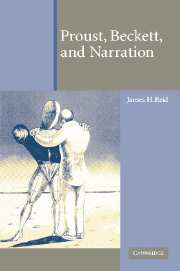Book contents
- Frontmatter
- Contents
- List of abbreviations
- Introduction
- 1 Remembering forgetting: Le Drame du coucher
- 2 Impressions, the instant of artistic consciousness, and social history
- 3 Lying, irony, and power: Proust's deceptive allegories
- 4 Proust's forgetful ironies
- 5 Molloy's Way: The parody of allegory
- 6 Moran's Way: The forgetful spiral of irony
- 7 Malone Dies and the impossibility of not saying I
- 8 The Unnamable: The death of the ironical self and the return of history
- Notes
- Bibliography
- Index
5 - Molloy's Way: The parody of allegory
Published online by Cambridge University Press: 22 September 2009
- Frontmatter
- Contents
- List of abbreviations
- Introduction
- 1 Remembering forgetting: Le Drame du coucher
- 2 Impressions, the instant of artistic consciousness, and social history
- 3 Lying, irony, and power: Proust's deceptive allegories
- 4 Proust's forgetful ironies
- 5 Molloy's Way: The parody of allegory
- 6 Moran's Way: The forgetful spiral of irony
- 7 Malone Dies and the impossibility of not saying I
- 8 The Unnamable: The death of the ironical self and the return of history
- Notes
- Bibliography
- Index
Summary
That is what has had a fatal effect on my development, my lack of memory, no doubt about it
(TN, 337)Forgetting and lying, along with the discursive modes that make them possible, allegory and irony, play crucial roles in Samuel Beckett's first-person narration, as they do in Proust's. Beckett was profoundly influenced by the ways in which Proust's writing narrator dramatized his forgetting and lying as rhetorical processes that structure and question perception, memory, thought, and consciousness. Beckett's early trilogy of novels – Molloy, Malone Dies, and The Unnamable – foregrounds its narrators' forgetting and lying in a manner that deconstructs and parodies Proust's remembering narrator and his allegory of temporal differentiation and deconstruction. But the trilogy also parodies Proust's (and Beckett's own) ironical narrators and their search for indifference. The narrators in the trilogy thus reread and rewrite Proust's first-person narrator.
On the surface, the trilogy's rereading of Proust's first-person narrator opens up an historical difference between Proust's remembering narrator, who sincerely seeks to express his individual difference through art, and Beckett's forgetful and deceitful narrators, who ironically mock the claim to express individual difference. It is as if Beckett were following Proust's advice that the best way to differentiate one's writing from a precursor's is through pastiche. But Beckett asserts this historical difference, paradoxically, by means of a rhetorical figure that negates historical difference: irony.
- Type
- Chapter
- Information
- Proust, Beckett, and Narration , pp. 79 - 98Publisher: Cambridge University PressPrint publication year: 2003



